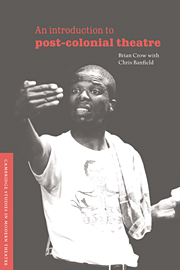Book contents
- Frontmatter
- Contents
- Preface
- Acknowledgements
- Introduction
- 1 Derek Walcott and a Caribbean theatre of revelation
- 2 August Wilson's theatre of the blues
- 3 Jack Davis and the drama of Aboriginal history
- 4 Wole Soyinka and the Nigerian theatre of ritual vision
- 5 Athol Fugard and the South African ‘workshop’ play
- 6 Badal Sircar's Third Theatre of Calcutta
- 7 Girish Karnad and an Indian theatre of roots
- Conclusion
- Further reading list
- Index
5 - Athol Fugard and the South African ‘workshop’ play
Published online by Cambridge University Press: 26 February 2010
- Frontmatter
- Contents
- Preface
- Acknowledgements
- Introduction
- 1 Derek Walcott and a Caribbean theatre of revelation
- 2 August Wilson's theatre of the blues
- 3 Jack Davis and the drama of Aboriginal history
- 4 Wole Soyinka and the Nigerian theatre of ritual vision
- 5 Athol Fugard and the South African ‘workshop’ play
- 6 Badal Sircar's Third Theatre of Calcutta
- 7 Girish Karnad and an Indian theatre of roots
- Conclusion
- Further reading list
- Index
Summary
While this book was being written far-reaching changes were occurring in the republic of South Africa. After almost half a century during which the racial policies of the government of South Africa gained it a place of special odium in the international community, the system of apartheid has been formally dismantled and in largely trouble-free elections an African National Congress (ANC) government, elected for the first time by a majority of the population, has come to power. The legacy of almost fifty years of apartheid policies will not, of course, be easily overcome. Since the accession of the Nationalist Party in 1948, the state in South Africa has systematically used its powers – physical, political and economic – to dominate and coerce the majority non-white population in the name of so-called ‘separate development’. The result is a degree of social injustice extraordinary by any standards, and communities torn by very high rates of crime, political violence and a multitude of other ills. Though the current mood is justifiably optimistic and hopeful, Nelson Mandela's government faces enormous challenges. A black population mostly living in squalid conditions in the townships and ‘homelands’ has large expectations of rapid improvement in their standards of living and quality of life. Many of the white minority are nervous about the threat to their way of life, and some, especially amongst the Afrikaans-speaking Boers, are unwilling to give up the substance of apartheid, even if they have no choice but to accept the formal changes. And as the black-on-black violence between ANC and Inkatha supporters before the elections clearly demonstrated, there is a terrifying potential for large-scale factional and ethnic violence in the new republic.
- Type
- Chapter
- Information
- An Introduction to Post-Colonial Theatre , pp. 96 - 111Publisher: Cambridge University PressPrint publication year: 1996

